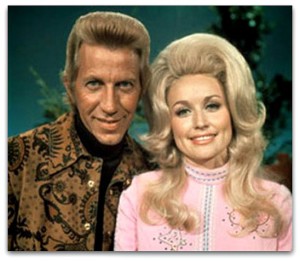 In an interview I heard Dolly Parton discuss how, when she decided to leave The Porter Wagoner Show, Porter didn’t take it well. Her popularity skyrocketed when Porter gave her a regular spot every week but it was Porter’s show and there was only room for one star. She felt that staying would hold her back: he was unhappy that, after giving her a start, she was taking away an important element of his show.
In an interview I heard Dolly Parton discuss how, when she decided to leave The Porter Wagoner Show, Porter didn’t take it well. Her popularity skyrocketed when Porter gave her a regular spot every week but it was Porter’s show and there was only room for one star. She felt that staying would hold her back: he was unhappy that, after giving her a start, she was taking away an important element of his show.
Despite her need to move on, Dolly cared about Porter and was very grateful to him. In an effort to mend fences she decided to write a song for him. That song turned out to be “I Will Always Love You,” one of the most popular songs of all time.
It is doubtful that many people would be interested in hearing about the boss who gave you a start being resentful when you left. It’s a very specific situation and a rather negative story. Being the brilliant songwriter that she is, Dolly honed in on the emotion of needing to leave someone you still loved. She drew upon her genuine emotion and applied it to a story that more people could relate to.
It’s also part of Dolly’s genius that in the opening lines she says “If I should stay I would only be in your way,” when a more accurate version of her story might have been “If I should stay you would only be in my way.” Saying that she was leaving for the good of the other person made her seem like she was making a noble sacrifice, and that made the singer much more likeable than if she was leaving because it was better for her.
You can write a song about anything but if you want to make a living as a songwriter, you need to find subjects with broad appeal. If a folk artist sings about a river town it might be a colorful travelogue full of descriptive details about the specific quality of that town. If a commercial songwriter wrote about the same town, he would probably focus on something that applies to more people. For example, he might write about how friendly people in a small town can be and how much the singer loves his home. Or he might have the singer wonder where the river goes and use that as a metaphor for someone wondering if there’s more to life.
To be universal you do not have to exclude specific details that bring the story to life. Gretchen Wilson’s song “Redneck Woman” uses colorful images that only apply to a redneck woman, but her attitude of making no apologies for who she is can be appreciated by anyone.
A good practice to get into when you write is asking yourself, “Who is going to want to hear about this?” If songwriting for you is therapy or a way of journaling, then anything that is meaningful to you is a perfect subject. But if you want to connect to a widespread audience, it’s helpful to try to see your song from their point of view.
